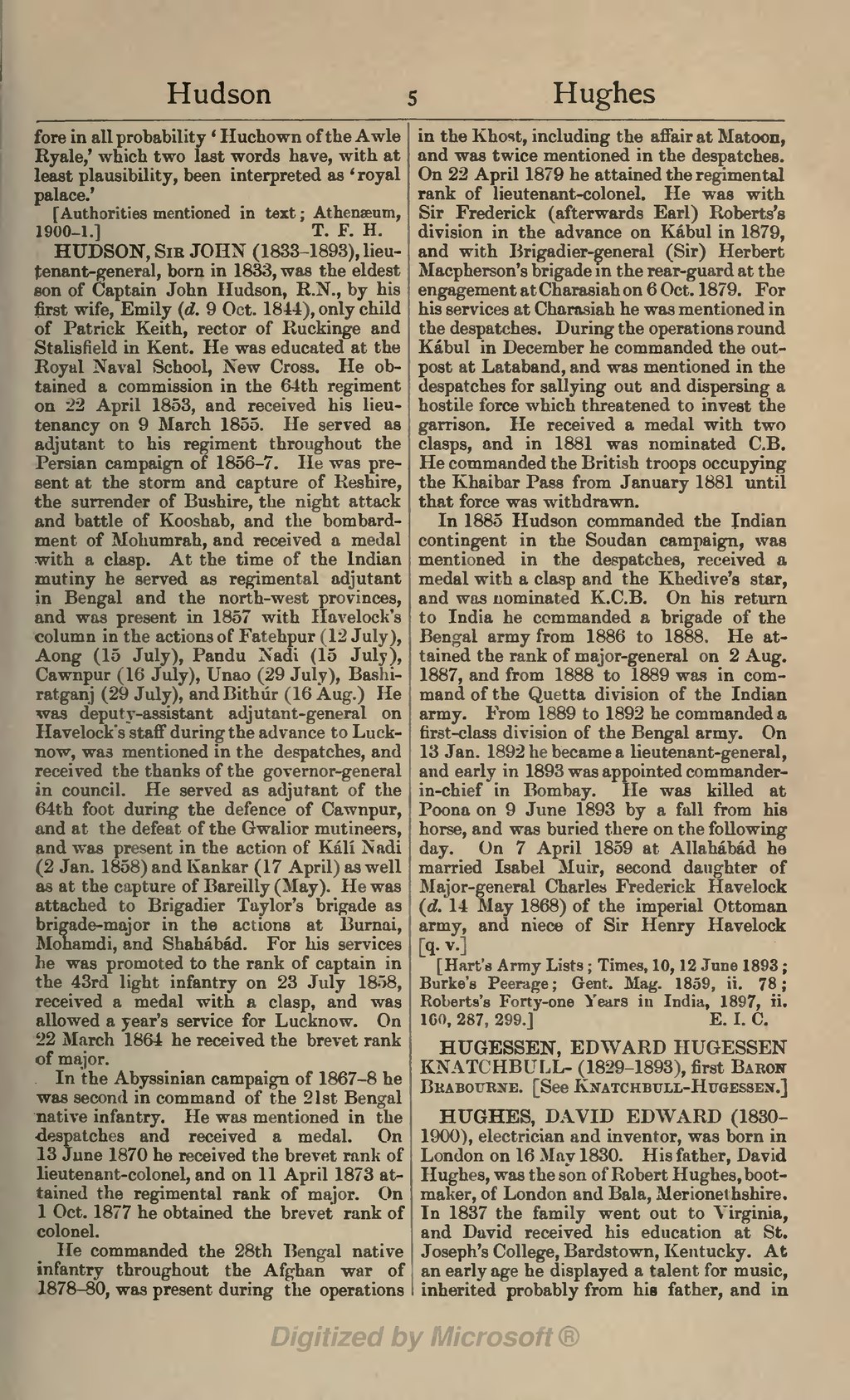fore in all probability 'Huchown of the Awle Ryale,' which two last words have, with at least plausibility, been interpreted as 'royal palace.'
[Authorities mentioned in text; Athenæum, 1900–1.]
HUDSON, Sir JOHN (1833–1893), lieutenant-general, born in 1833, was the eldest son of Captain John Hudson, R.N., by his first wife, Emily (d. 9 Oct. 1844), only child of Patrick Keith, rector of Ruckinge and Stalisfield in Kent. He was educated at the Royal Naval School, New Cross. He obtained a commission in the 64th regiment on 22 April 1853, and received his lieutenancy on 9 March 1855. He served as adjutant to his regiment throughout the Persian campaign of 1856-7. He was present at the storm and capture of Reshire, the surrender of Bushire, the night attack and battle of Kooshab, and the bombardment of Mohumrah, and received a medal with a clasp. At the time of the Indian mutiny he served as regimental adjutant in Bengal and the north-west provinces, and was present in 1857 with Havelock's column in the actions of Fatehpur (12 July), Aong (15 July), Pandu Nadi (15 July), Cawnpur (16 July), Unao (29 July), Bashiratganj (29 July), and Bithúr (16 Aug.) He was deputy-assistant adjutant-general on Havelock's staff during the advance to Lucknow, was mentioned in the despatches, and received the thanks of the governor-general in council. He served as adjutant of the 64th foot during the defence of Cawnpur, and at the defeat of the Gwalior mutineers, and was present in the action of Kali Nadi (2 Jan. 1858) and Kankar (17 April) as well as at the capture of Bareilly (May). He was attached to Brigadier Taylor's brigade as brigade-major in the actions at Burnai, Mohamdi, and Shahábád. For his services he was promoted to the rank of captain in the 43rd light infantry on 23 July 1858, received a medal with a clasp, and was allowed a year's service for Lucknow. On 22 March 1864 he received the brevet rank of major.
In the Abyssinian campaign of 1867-8 he was second in command of the 21st Bengal native infantry. He was mentioned in the despatches and received a medal. On 13 June 1870 he received the brevet rank of lieutenant-colonel, and on 11 April 1873 attained the regimental rank of major. On 1 Oct. 1877 he obtained the brevet rank of colonel.
He commanded the 28th Bengal native infantry throughout the Afghan war of 1878-80, was present during the operations in the Khost, including the affair at Matoon, and was twice mentioned in the despatches. On 22 April 1879 he attained the regimental rank of lieutenant-colonel. He was with Sir Frederick (afterwards Earl) Roberts's division in the advance on Kábul in 1879, and with Brigadier-general (Sir) Herbert Macpherson's brigade in the rear-guard at the engagement at Charasiah on 6 Oct. 1879. For his services at Charasiah he was mentioned in the despatches. During the operations round Kábul in December he commanded the outpost at Lataband, and was mentioned in the despatches for sallying out and dispersing a hostile force which threatened to invest the garrison. He received a medal with two clasps, and in 1881 was nominated C.B. He commanded the British troops occupying the Khaibar Pass from January 1881 until that force was withdrawn.
In 1885 Hudson commanded the Indian contingent in the Soudan campaign, was mentioned in the despatches, received a medal with a clasp and the Khedive's star, and was nominated K.C.B. On his return to India he commanded a brigade of the Bengal army from 1886 to 1888. He attained the rank of major-general on 2 Aug. 1887, and from 1888 to 1889 was in command of the Quetta division of the Indian army. From 1889 to 1892 he commanded a first-class division of the Bengal army. On 13 Jan. 1892 he became a lieutenant-general, and early in 1893 was appointed commander-in-chief in Bombay. He was killed at Poona on 9 June 1893 by a fall from his horse, and was buried there on the following day. On 7 April 1859 at Allahábád he married Isabel Muir, second daughter of Major-general Charles Frederick Havelock (d. 14 May 1868) of the imperial Ottoman army, and niece of Sir Henry Havelock [q. v.]
[Hart's Army Lists; Times, 10, 12 June 1893; Burke's Peerage; Gent. Mag. 1859, ii. 78; Roberts's Forty-one Years iu India, 1897, ii. 160, 287, 299.]
HUGESSEN, EDWARD HUGESSEN KNATCHBULL- (1829–1893), first Baron Brabourne. [See Knatchbull-Hugessen.]
HUGHES, DAVID EDWARD (1830–1900), electrician and inventor, was born in London on 16 May 1830. His father, David Hughes, was the son of Robert Hughes, bootmaker, of London and Bala, Merionethshire, In 1837 the family went out to Virginia, and David received his education at St. Joseph's College, Bardstown, Kentucky. At an early age he displayed a talent for music, inherited probably from his father, and in
